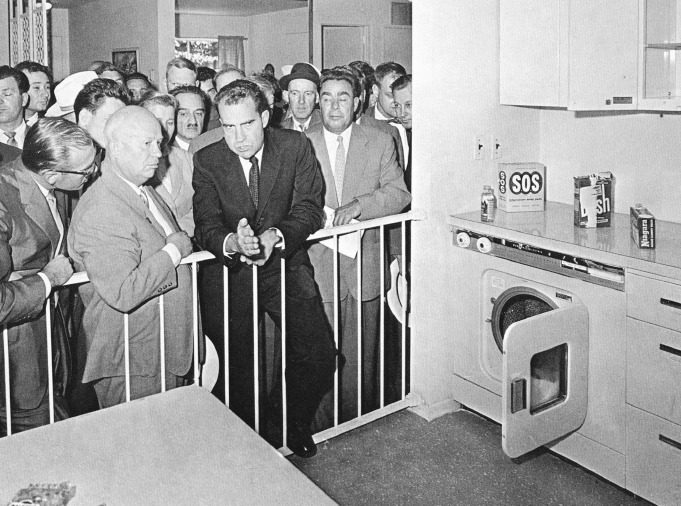Reform and De-Stalinization
In 1953, Stalin finally died. Even as his heirs struggled for power, they realized that reforms were necessary because of the widespread fear and hatred created by Stalin’s political terrorism. The power of the secret police was curbed, and many forced-labor camps were gradually closed. Change was also necessary to spur economic growth, which had sputtered in the postwar years. Moreover, Stalin’s belligerent foreign policy had led directly to a strong Western alliance, which took steps to isolate the Soviet Union.
The Soviet leadership was badly split on the question of just how much change could be permitted while still preserving the system. Conservatives wanted to move slowly. Reformers, led by Nikita Khrushchev (1894–1971), argued for major innovations. Khrushchev (kroush-CHAWF) emerged as the new Soviet premier in 1955.
To strengthen his position and that of his fellow reformers, Khrushchev launched a surprising attack on Stalin and his crimes at a closed session of the Twentieth Party Congress in 1956. Khrushchev told the delegates that Stalin had “supported the glorification of his own person with all conceivable methods” to build a propagandistic “cult of personality.”1 Moreover, Khrushchev claimed, Stalin had bungled the country’s defense in World War II and unjustly imprisoned and tortured thousands of loyal Communists.
The U.S.S.R. now entered a period of genuine liberalization — or de-Stalinization, as it was called in the West. The party jealously maintained its monopoly on political power, but Khrushchev brought in new members. Calling for a relaxation of tensions with the West, the new premier announced a policy of “peaceful coexistence.” In domestic policies, state planners shifted resources from heavy industry and the military toward consumer goods and agriculture, and relaxed Stalinist workplace controls. Leaders in other Communist countries grudgingly adopted similar reforms, and the East Bloc’s standard of living began to improve.

The Kitchen DebateKhrushchev and Nixon discuss the merits of the American way during the famous kitchen debate. Leonid Brezhnev, the future leader of the Soviet Union (from 1964 to 1982), stands on the right, behind Nixon. (AP Photo)
Khrushchev liked to boast that East Bloc living standards and access to consumer goods would soon surpass those of the West. Soviet and East Bloc reforms did spark a limited consumer revolution. Consumers’ options were more modest than those in the West, but people in Communist countries also purchased automobiles, televisions, and other consumer goods in increasing numbers in the 1960s.
De-Stalinization created great ferment among writers and intellectuals who sought freedom from the constraints of socialist realism, such as Russian author Boris Pasternak (1890–1960), who published his great novel Doctor Zhivago in 1957. Appearing in the West but not in the Soviet Union until 1988, Doctor Zhivago is both a literary masterpiece and a powerful challenge to communism. Mainstream Communist critics denounced Pasternak, whose book was circulated in secret — but in an era of liberalization he was neither arrested nor shot. Other talented writers followed Pasternak’s lead, and courageous editors let the sparks fly. Aleksandr Solzhenitsyn (sohl-zhuh-NEET-suhn) (1918–2008) created a sensation when his One Day in the Life of Ivan Denisovich was published in 1962. Solzhenitsyn’s novel portrays, in grim detail, life in a Stalinist concentration camp, a life to which Solzhenitsyn himself had been unjustly condemned.
